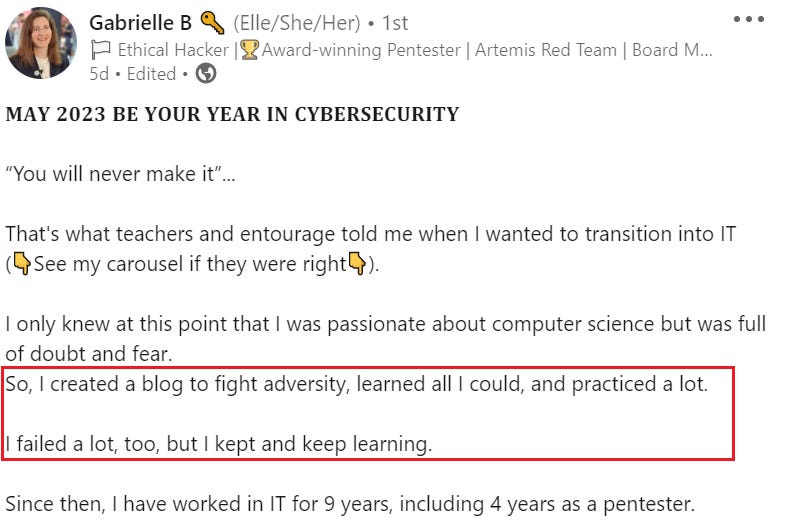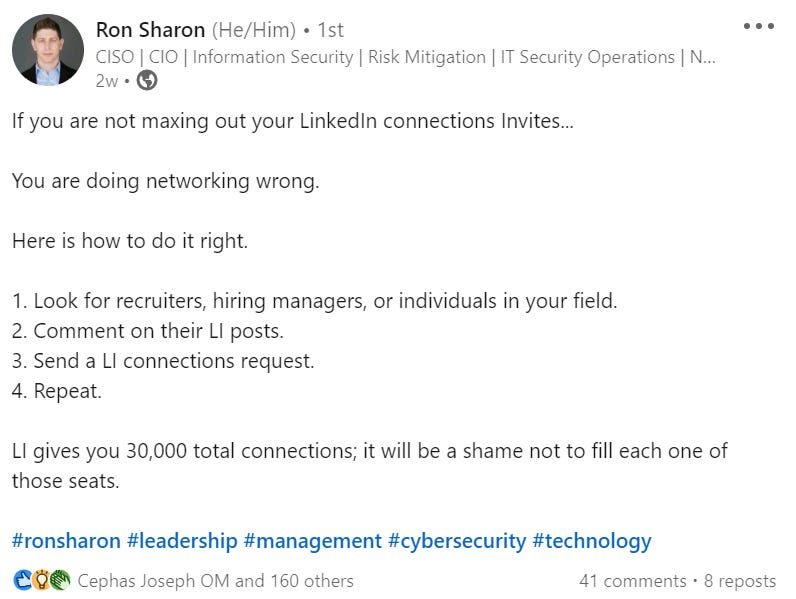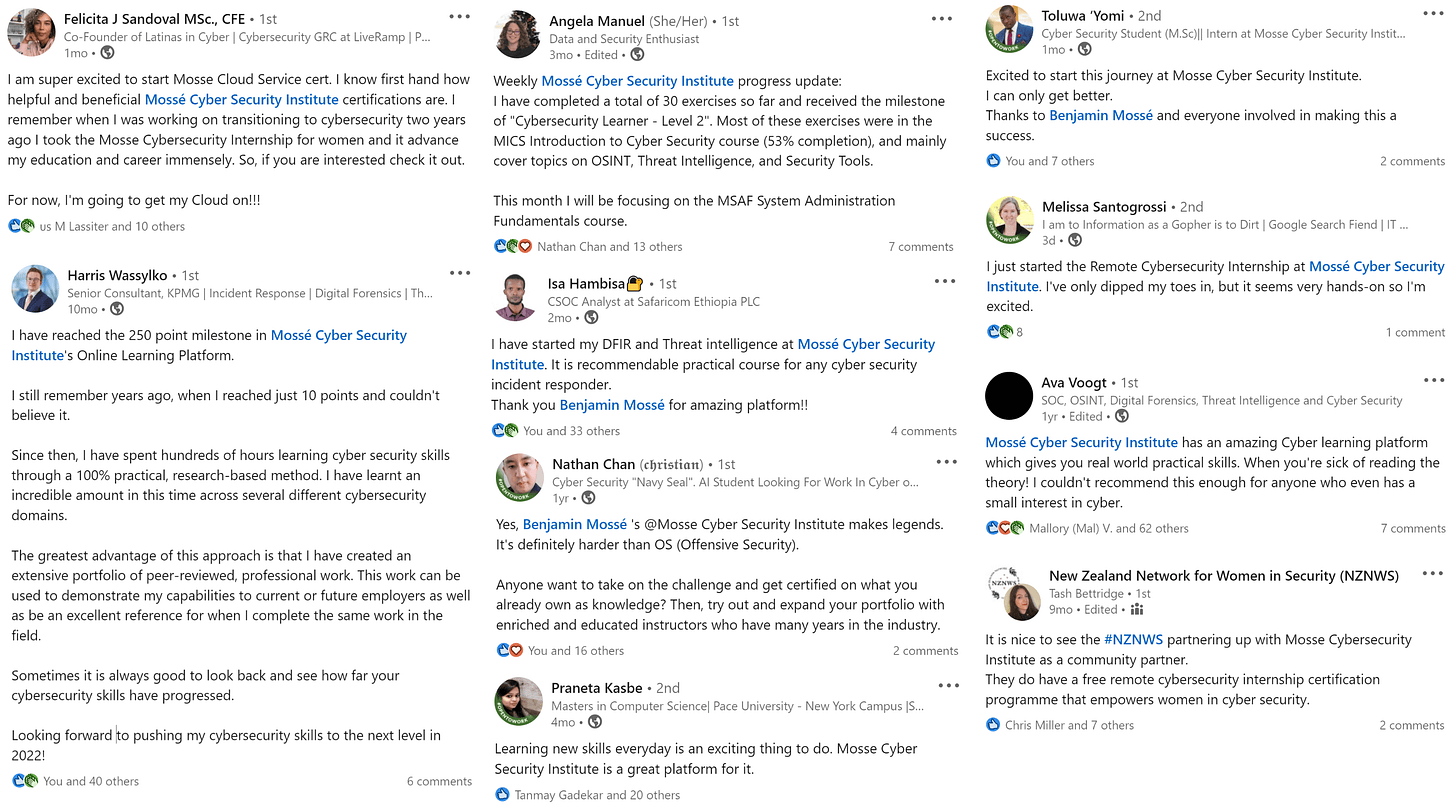MCSI #002: Learn how to create business connections and access unlimited opportunities
Learn a proven formula to always have a job in cybersecurity
Are you interested in a career in cybersecurity? The illustration below is known as The Employment Equation. It seeks to condense some of the most important ideas you need to know to get a job in cybersecurity.

We will talk about how to access cybersecurity jobs today in this newsletter. My goal is to provide a successful strategy that will result in a lifetime of job opportunities.
This method is not a fast way to get a lot of followers on social media. Instead, it is a long-term plan that will take a year or two to set up, but once you have it running, you'll be able to rely on it for years to come.
Lesson #1 - Understand the employment ecosystem
If you're just starting out in cybersecurity, one major slip-up I often see is not understanding the job market. It's not the same way to get hired at a small company as it is at a big business, or to get a company to sponsor you to relocate to another country. It's critical to understand each company's situation and know how to work around their particular hiring processes if you want to be successful.
Let’s talk about some broad categories:
a) Applying to join large organizations
Government agencies and big businesses have strict hiring standards. Unless you satisfy all the important criteria, your application won't be considered. To put it another way, if they require a specific certification and you don't have it, you won't stand a chance unless you know the people in charge and can sway them.
Make sure that you fulfil all the mandatory requirements
If you can, have previous work experience related to their sector
Familiarize yourself with their operating environment and teams
Present yourself as a good fit for their culture
Align yourself with their programs of work and cultural trends
Highlight how you can contribute to activities they are working on right now
b) Applying to join boutique security firms
Small businesses are usually more open to new ideas. It's not as important to have all of the qualifications listed in the job description. It's also not so important to have experience. They want someone who fits well with their culture and can learn the tasks required quickly.
Prove that you have most of the skills they want
Be sure that you fit in with their company culture
Be ready to adjust your life to work with them (don’t be demanding)
Demonstrate that you can learn new skills quickly and that you're willing to study outside of work hours
c) Working with external recruiters
Recruiters work on behalf of their clients. They look for people that match their needs.
The first step is to determine who the recruiter works for and if their clients match the type of companies you want to work with.
The second is to remember that recruiters typically charge a 12-22% fee for every successful candidate they place. That means if you are hired at a salary of $100,000, the recruiter will get a $22,000 fee from the client. This means that clients are not likely to give a candidate a chance unless they meet at least 90% of the requirements.
For the recruiter, they are not likely to spend time trying to find a job for someone who makes a salary less than $60,000 because placing people takes a great deal of effort.
The ideal situation is to be independent of recruiters. Employers will find you more enticing because they won't have to pay extra fees to recruit you. However, if you must work with recruiters, be sure that you perfectly match their clients' needs. The goal should be to work well together.
d) Convincing a company to sponsor your visa
If you want a company to sponsor you, you need to be extraordinary. Sponsoring a candidate takes lots of money and time, plus the company takes a big risk if it doesn’t work out.
Furthermore, when you ask to be sponsored, you're also competing against local candidates that may be just as talented as you.
Become exceptional first, then start thinking about relocating
Find companies who have sponsored candidates in the past
Come up with strategies to reduce the risks on the part of the employer should the job not work out
e) Don’t set yourself up for failure
If you don't meet the qualifications that a big organization requires, consider applying to a smaller firm. Invest in yourself to meet their criteria or search for a recruiter that has clients for your profile. If you are just starting out, look for an internship instead of a higher-level job. If you are a junior employee and want to move up, be sure to have the experience, credentials, references, and "shoulders" for the job.
It's important that you set yourself up for success. Don't give yourself a disadvantage by trying to apply for positions you are not prepared for.
Lesson #2 - Build an exceptional profile
Once you have a strong grasp of the job market, the next step is to make yourself stand out. I'm not suggesting you pretend to be amazing online by collecting likes and pointless connections. Instead, I want you to really become an outstanding cyber security specialist.
Check out this LinkedIn post from Gabrielle Botbol as an illustration:

In a nutshell, here’s what Gabrielle did:
Obtained degrees in Information Technology
Worked as a system administrator and software developer
Learnt “how to learn” and taught others
Secured a cybersecurity internship
Specialized in penetration testing
Supported multiple initiatives to bring more women in cybersecurity
She undoubtedly had doubts and faced many obstacles to get where she is, but she made the right decisions and followed the correct steps! You can follow suit as well!
Create yourself a remarkable portfolio
Creating a portfolio is a great way to catch the attention of recruiters and employers. It won't cost you anything, and it will be useful throughout your whole career.
Here’s what a portfolio exactly is:
A collection of projects you can showcase to demonstrate your abilities
Your LinkedIn profile and curriculum vitae
A blog that you’ve used to document your learning journey and teach others
Industry initiatives you’ve contributed to
References from mentors, colleagues and previous employers
Even if you don't have any professional experience in cybersecurity, you can start constructing your portfolio today.
Lesson #3 - Become a high-value individual
In terms of cyber security, what does it mean to be a high-value person? Although there may not be a single definition, the following examples should help you get started:
Create a study group and teach cybersecurity to others
Help organize a cybersecurity conference in your area
Build tools that others can use to defend their networks and investigate attacks
Share what you’ve learnt on social media and inspire others to learn too
Volunteer to help protect vulnerable organizations from cyber threats
Answer questions on forums and help people solve cyber problems
When you become a high-value person, anything is possible! People begin mentioning your name. They mention the contributions you've made. They approach you with questions. They recommend you for positions. By then, you ought to already have 10–30 reliable business connections that can assist you in finding and keeping a job. Additionally, it should be simple to acquire references at that point.
You should be aware that it can take years to become well regarding within the cybersecurity industry. Not because it's very challenging. But because takes time for people to become familiar with you and your good work.
If you want to accelerate your career, then spend at least 1 hour per day dedicated to helping others. It’s that simple!
Lesson #4 - Harness the power of social media
a) Social media as a force for good
You should take advantage of the power of social media to increase the impact of your work.
People who use social media can be talked about in a negative way, like being too focused on appearances, not on substance, or even exaggerating their accomplishments. But you can use social media for good.
For example, if you write a helpful tool, let people know about it through social media. This way, you can get feedback from users. You can also promote an upcoming cybersecurity conference in your area.
Think of social media as a way to boost the good stuff you and others are doing.
b) Social media as a networking platform
There are many strategies you can use to get in touch with hiring managers and recruiters. Additionally, if you're using social media to promote your exceptional work, you might attract team leaders who may consider hiring you.
Ron Sharon provided this helpful tactic:
The only social media rule I suggest following is to refrain from bothering people. Don't grovel for a job. Don’t send 20 messages to folks. Instead, concentrate on being a high-value person.
When you’re ready, here’s how we can help you
We appreciate you reading thus far. You must be very interested in a career in cybersecurity!
Our goal at MCSI is to cut the price of cyber education by 95%. Basically, we don't ever want someone to put financial burden on their family or incur debt in order to study cybersecurity. If you haven't already, I urge you to visit our free library, where we regularly post informative videos and articles.
Browse our certifications if you're interested in gaining practical skills and creating a portfolio that demonstrates your talents.
We’ve helped 25,000+ students acquire in-demand practical skills that have allowed them to land their first cybersecurity job or advance their career. Our mission is to do the same for you.


